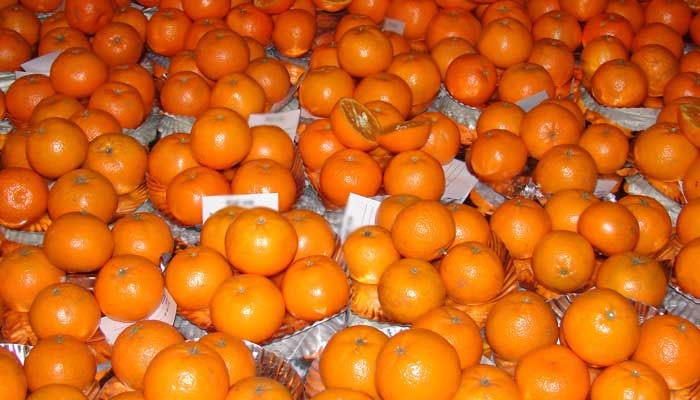Kinnow export target set at 250,000 tonnes
KARACHI: Pakistan’s export of kinnow has witnessed a sharp decline of 50 per cent over the past five years, now reduced to just 250,000 tonnes. This reduction is attributed to the combined effects of climate change, outdated crop varieties and declining production. Smog and fog are expected to exacerbate the situation, with production anticipated to drop by an additional 35 per cent this year.
The All Pakistan Fruit and Vegetable Exporters Association (PFVA) has set this season’s export target at 250,000 tonnes, a significant decrease of 50,000 tonnes compared to last year and half of what was exported five years ago.
Patron-in-Chief of the PFVA Waheed Ahmed highlighted the alarming impact of climatic changes on kinnow production and quality. He explained that prolonged heatwaves and delayed winter seasons have not only shortened the growing season but also reduced sweetness, moisture content, and overall quality of the fruit. The season is already delayed by 15 days, resulting in higher prices in local markets -- an increase of 10 per cent compared to last year.
One major issue is the age of Pakistan’s kinnow variety, which is over 60 years old and highly susceptible to diseases and weather changes. Waheed Ahmed emphasized that no crop variety in the world remains productive for more than 25 years.
For the past decade, the PFVA has been urging both federal and provincial governments to invest in research and development (R&D) and to cultivate new varieties in different areas, but no substantial progress has been made. “If new varieties are not developed within three to four years, Pakistan’s kinnow export will come to a complete halt,” Ahmed warned.
Already, half of the 250 kinnow processing factories have shut down due to financial losses, threatening the livelihoods of 300,000 workers and risking Rs300 billion invested in this industry.
Pakistan has also lost key export markets like China and Iran due to difficulty in competing with other nations, while the Russia-Ukraine conflict is expected to close access to Russia, a vital market for smaller-sized kinnows. Rising freight charges and extended shipping times to the UK, Canada, and Europe further compound logistical challenges. Waheed Ahmed called for urgent government intervention to ensure the survival of the kinnow industry. He urged for a focus on R&D to develop at least four new kinnow varieties and extend the export season from the current three months to 6-8 months. Without immediate action, he warned, Pakistan’s kinnow industry is on the brink of collapse.
-
 Czech Republic Supports Social Media Ban For Under-15
Czech Republic Supports Social Media Ban For Under-15 -
 Prince William Ready To End 'shielding' Of ‘disgraced’ Andrew Amid Epstein Scandal
Prince William Ready To End 'shielding' Of ‘disgraced’ Andrew Amid Epstein Scandal -
 Chris Hemsworth Hailed By Halle Berry For Sweet Gesture
Chris Hemsworth Hailed By Halle Berry For Sweet Gesture -
 Blac Chyna Reveals Her New Approach To Love, Healing After Recent Heartbreak
Blac Chyna Reveals Her New Approach To Love, Healing After Recent Heartbreak -
 Royal Family's Approach To Deal With Andrew Finally Revealed
Royal Family's Approach To Deal With Andrew Finally Revealed -
 Super Bowl Weekend Deals Blow To 'Melania' Documentary's Box Office
Super Bowl Weekend Deals Blow To 'Melania' Documentary's Box Office -
 Meghan Markle Shares Glitzy Clips From Fifteen Percent Pledge Gala
Meghan Markle Shares Glitzy Clips From Fifteen Percent Pledge Gala -
 Melissa Jon Hart Explains Rare Reason Behind Not Revisting Old Roles
Melissa Jon Hart Explains Rare Reason Behind Not Revisting Old Roles -
 Meghan Markle Eyeing On ‘Queen’ As Ultimate Goal
Meghan Markle Eyeing On ‘Queen’ As Ultimate Goal -
 Japan Elects Takaichi As First Woman Prime Minister After Sweeping Vote
Japan Elects Takaichi As First Woman Prime Minister After Sweeping Vote -
 Kate Middleton Insists She Would Never Undermine Queen Camilla
Kate Middleton Insists She Would Never Undermine Queen Camilla -
 King Charles 'terrified' Andrew's Scandal Will End His Reign
King Charles 'terrified' Andrew's Scandal Will End His Reign -
 Winter Olympics 2026: Lindsey Vonn’s Olympic Comeback Ends In Devastating Downhill Crash
Winter Olympics 2026: Lindsey Vonn’s Olympic Comeback Ends In Devastating Downhill Crash -
 Adrien Brody Opens Up About His Football Fandom Amid '2026 Super Bowl'
Adrien Brody Opens Up About His Football Fandom Amid '2026 Super Bowl' -
 Barbra Streisand's Obsession With Cloning Revealed
Barbra Streisand's Obsession With Cloning Revealed -
 What Did Olivia Colman Tell Her Husband About Her Gender?
What Did Olivia Colman Tell Her Husband About Her Gender?




